|
|
Ed Ruscha, Nine Swimming Pools and a Broken Glass, 1968/1976
|
 |
| |
|
Ed Ruscha, Nine Swimming Pools and a Broken Glass, 1968/1976,
second edition of 2000 copies [1]
|
N L
|
|
Ed Ruscha's artists' book, Nine Swimming Pools and a Broken Glass, published in 1968, marked a departure from his earlier photographic publications, most notably Twentysix Gasoline Stations in 1963. While his earlier works focused on mundane and everyday subjects, like gas stations and parking lots, Nine Swimming Pools and a Broken Glass ventured into a different realm of visual exploration.
Nine Swimming Pools was Ruscha's eighth artists' book. In this book, Ruscha continued his documentation of the Los Angeles landscape, a theme that would become central to much of his work. However, this time, he turned his attention to swimming pools, which symbolized a quintessential aspect of Southern California culture. The photos were all taken of swimming pools at low-rent Las Vegas hotels. Each photograph in the book captures a different swimming pool, often devoid of people, and the images are presented without any accompanying text.
|
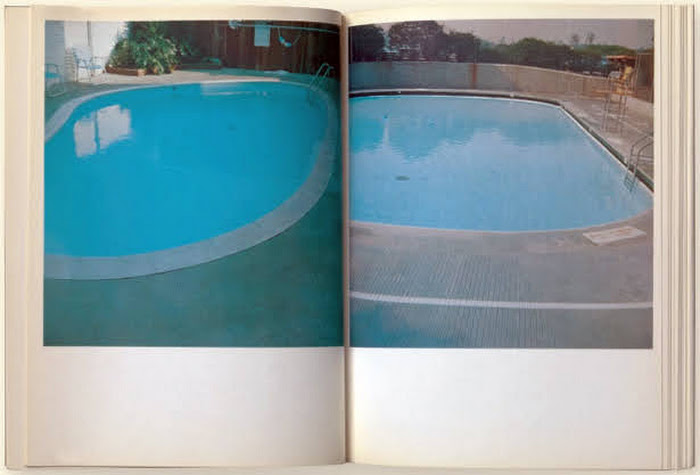 |
| |
|
Ed Ruscha, Nine Swimming Pools and a Broken Glass, 1968/1976, double page spread |
| |
|
The inclusion of "a Broken Glass" in the title is intriguing, as it adds an element of narrative disruption to the otherwise straightforward documentation [7]. It raises questions and invites viewers to contemplate the significance of this broken glass in the context of the serene swimming pools.
"Nine Swimming Pools and a Broken Glass" represents a shift in Ruscha's artistic journey, moving away from the banal and mundane to explore more complex and culturally charged subjects. It's a testament to his ability to capture the essence of a place and time through seemingly simple yet thought-provoking imagery, and it remains an influential work in the realm of contemporary art and photography.
Ed Ruscha, Nine Swimming Pools and a Broken Glass, 1968/1976
Original white wrappers with black lettering, 48 pp with 9 color photographic illustrations of swimming pools, and 1 of a broken glass against a blue background,. Self-published, Los Angeles, California. Second edition of 2000 copies. Missing glassine dust jacket, otherwise in mint condition.
Sold. |

|
|
|
|
|
 |
|
 |
|
 |
| |
|
|
|
|
 |
|
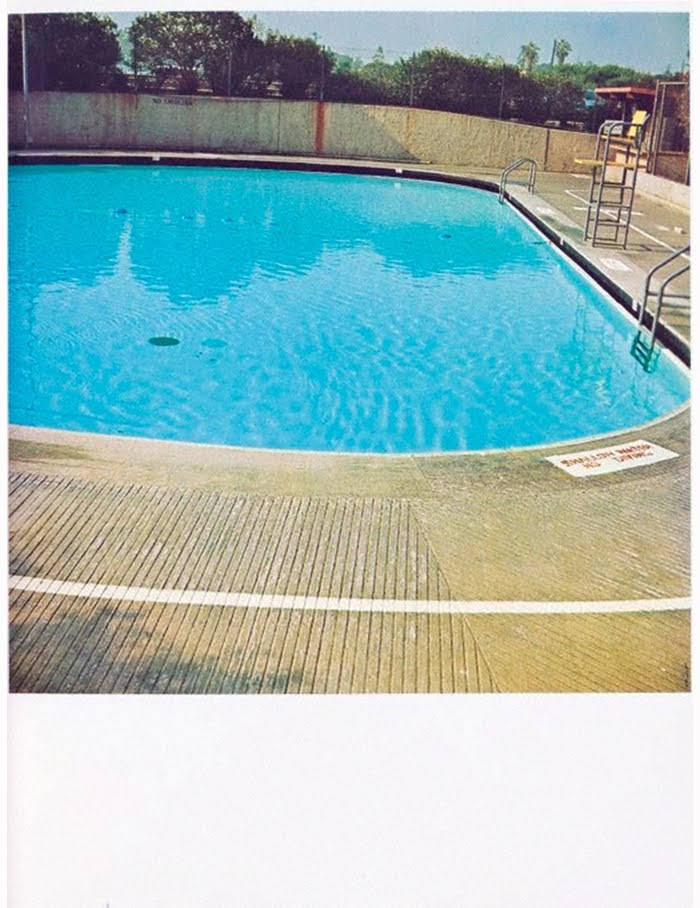 |
|
 |
| |
|
|
|
|
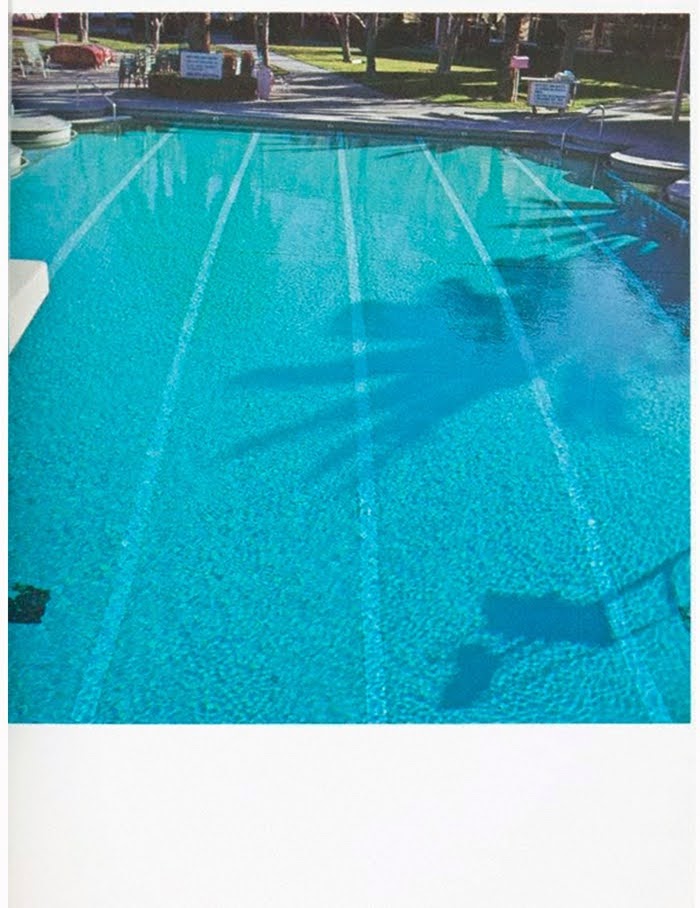 |
|
 |
|
 |
| |
|
|
|
|
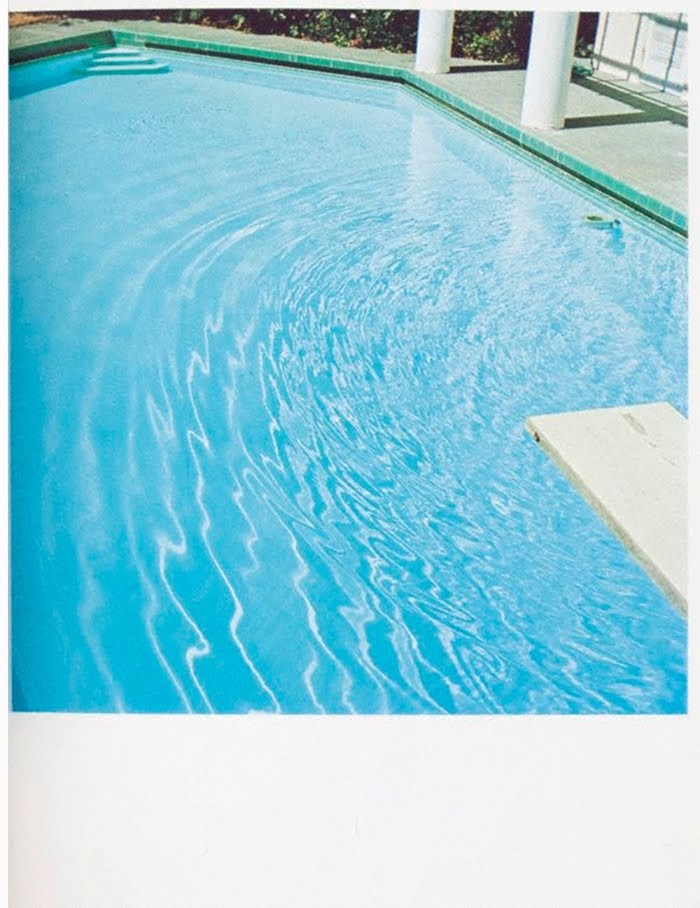 |
|
 |
|
 |
Ed Ruscha, Nine Swimming Pools and a Broken Glass, 1968/1976, second edition of 2000 copies, 48 pp with 9 color photographic illustrations of generic very blue swimming pools, and 1 of a broken glass against a blue background, interspersed among 52 blank pages
|
| |
|
Edward Joseph Ruscha IV ( 1937) is an American artist associated with the pop art and conceptual art movements. He has worked in the media of painting, printmaking, drawing, photography and film. He is also noted for creating several artist's books. Ruscha lives and works in Culver City, California.[5] Ruscha achieved recognition for paintings incorporating words and phrases and for his many photographic books, all influenced by the deadpan irreverence of the Pop Art movement [2].
Between 1962 and 1978, Ruscha produced sixteen small artist's books:
Twentysix Gasoline Stations, 1963
Various Small Fires, 1964
Some Los Angeles Apartments, 1965
Every Building on the Sunset Strip, 1966
Thirtyfour Parking Lots, 1967
Royal Road Test, 1967 (with Mason Williams and Patrick Blackwell)
Business Cards, 1968 (with Billy Al Bengston)
Nine Swimming Pools and a Broken Glass, 1968
Crackers, 1969 (with Mason Williams)
Real Estate Opportunities, 1970
Babycakes with Weights, 1970
A Few Palm Trees, 1971
Records, 1971
Dutch Details, 1971
Colored People, 1972
Hard Light, 1978 (with Lawrence Weiner) [2]
The 16 small artist's books remain definitive classics of the genre.
Stains (1969), in which Ruscha brought together 75 sheets of stains is rarely mentioned here, although this portfolio of mixed-media stains on paper is listed as a book following the catalogue raisonné.
Yet later he would also produce some deluxe editions, such as the high-profile Sayings from Mark Twain's Pudd'nhead Wilson (1995), a livre de peintre for which he created ten lithographs [8].
|
 |
|
 |
|
![Ed Ruscha. Babycakes (with weights), Multiples Inc., 1970 [From the portfolio Artists an Photographs]](https://lh3.googleusercontent.com/pw/ADCreHdXrNC3bNq3gYz_xsGo5R-c_M6Ai_EcC08-sGVkhEIwTLOSSPsUF1qd6xfR-PibMUGsEr5hHZTRR9V-gxJEvZe1aFQOoQSviCI4fnzcU7tDn0dOVjIe=w1600-h1983-p-k) |
Ed Ruscha, Twentysix Gasoline Stations, 1963
|
|
Edward Ruscha, Crackers, Heavy Industries, Hollywood, 1969
|
|
Ed Ruscha. Babycakes (with weights), Multiples Inc., 1970 [From the portfolio Artists an Photographs]
|
 |
|
 |
|
 |
Ed Ruscha, Real Estate Opportunities, 1970
|
|
Thirtyfour Parking Lots, 1967
|
|
Ed Ruscha, Some Los Angeles Apartmens, 1965 |
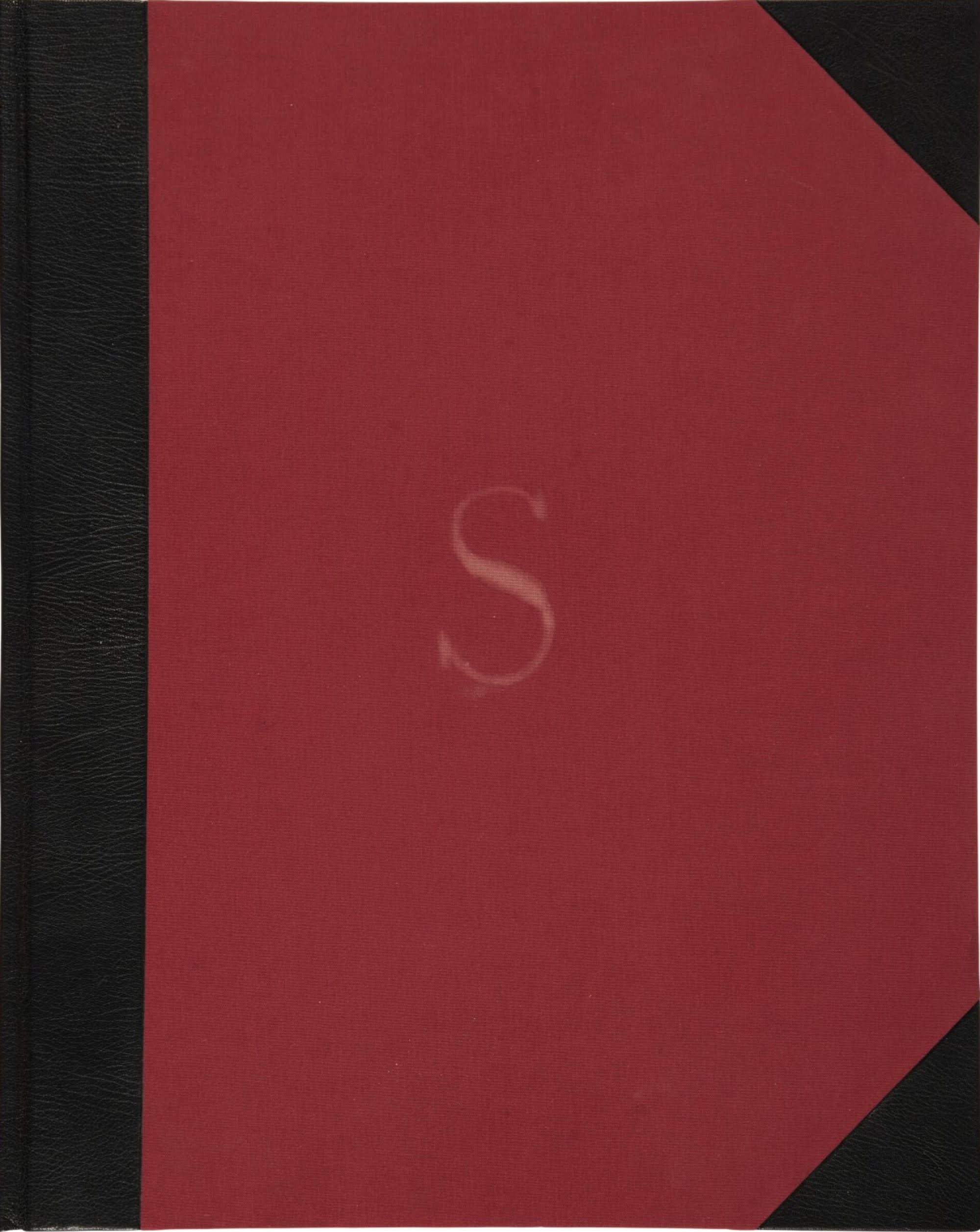
|
|
 |
|
 |
Ed Ruscha, Sayings from Mark Twain's Pudd'nhead Wilson, San Francisco, Greve/Hine & Limestone Press, 1995
|
|
Ed Ruscha, lithography for Sayings from Mark Twain's Pudd'nhead Wilson, San Francisco, Greve/Hine & Limestone Press, 1995 © Ed Ruscha
|
|
Ed Ruscha, lithography for Sayings from Mark Twain's Pudd'nhead Wilson, San Francisco, Greve/Hine & Limestone Press, 1995 © Ed Ruscha
|
| |
|
Ruscha's artist books have proved to be deeply influential, beginning with Bruce Nauman’s Burning Small Fires (1968), for which Nauman burned Ruscha's Various Small Fires and Milk (1964) and photographed the process. More than forty years later, photographer Charles Johnstone relocated Ruscha's Twentysix Gasoline Stations in Cuba, producing the portfolio Twentysix Havana Gasoline Stations (2008). A recent homage is One Swimming Pool (2013) by Dutch artist Elisabeth Tonnard, who re-photographed one of the photographs from Ruscha's Nine Swimming Pools and a Broken Glass (1968) and enlarged it to the size of a small swimming pool, consisting of 3164 pages the same size as the pages in Ruscha's original book. The pages of this ‘pool on a shelf’ can be detached to create the life-size installation.[6]
|
| |
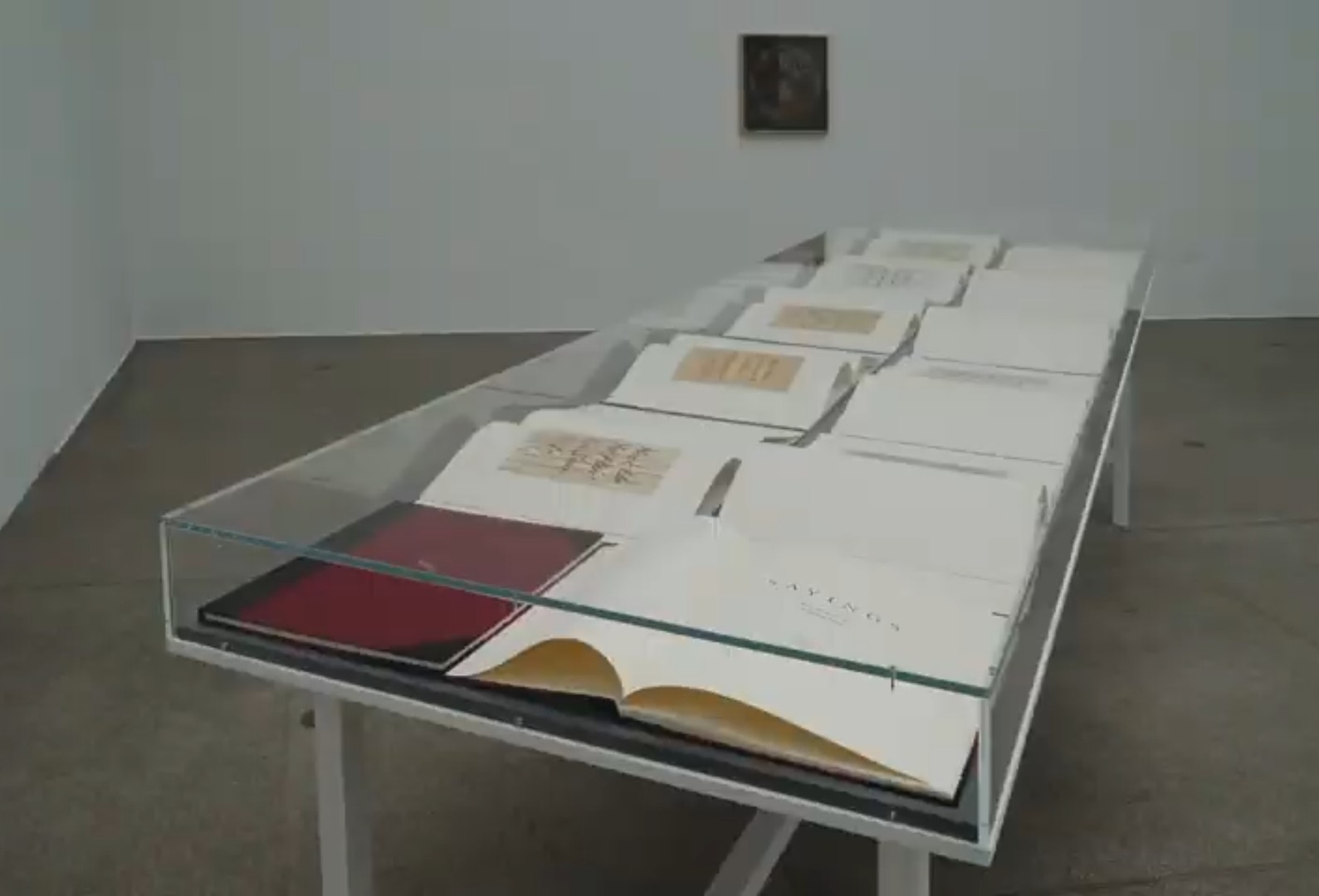
|
| Ed Ruscha's Sayings from Mark Twain's Pudd'nhead Wilson, on display as part of a 2018 exhibitionin Secession, Vienna [3] |
| |
|

|

Edward Ruscha. A Book Accompanying the Exhibition of Prints, Drawings, and Books of Edward Ruscha at the Minneapolis Institute of Arts (with Business Cards), 1971 |
|
Artists' Books | Un coup de dés jamais n'abolira le hasard, het eerste kunstenaarsboek
The Museum of Modern Art | Edward Ruscha. Edward Ruscha. Nine Swimming Pools and a Broken Glass. 1968 | MoMA
Artist's book, initially a part of the Belgian Daled Collection.
In the late 1960s and 1970s, Herman Daled, with his former wife, Nicole Daled-Verstraeten, brought together one of the greatest collections of Conceptual art ever assembled. In 2011, he sold part of his collection to the Museum of Modern Art. [www.moma.org/magazine]
Ed Ruscha, Nine Swimming Pools and a Broken Glass [First Edition] | www.printedmatter.org
Vienna Secession, Vereinigung bildender Künstler*innen Wiener Secession, Friedrichstraße 12, 1010 Vienna | Ed Ruscha in conversation with Kasper König
Johan Velter, Het verborgen beeld, of De wereld, het werkmateriaal: het werk van Elisabeth Tonnard
|
| |
|
|
|
|
| |
|
|
|
|

|
|
|
|
|
 |
|
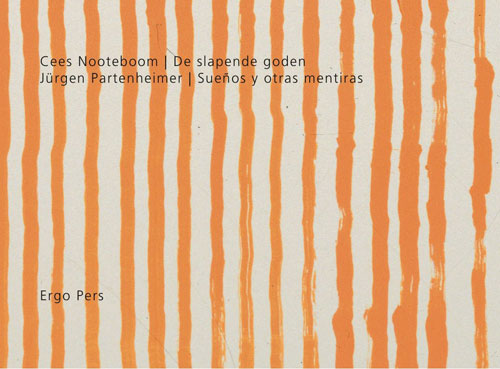
|
|
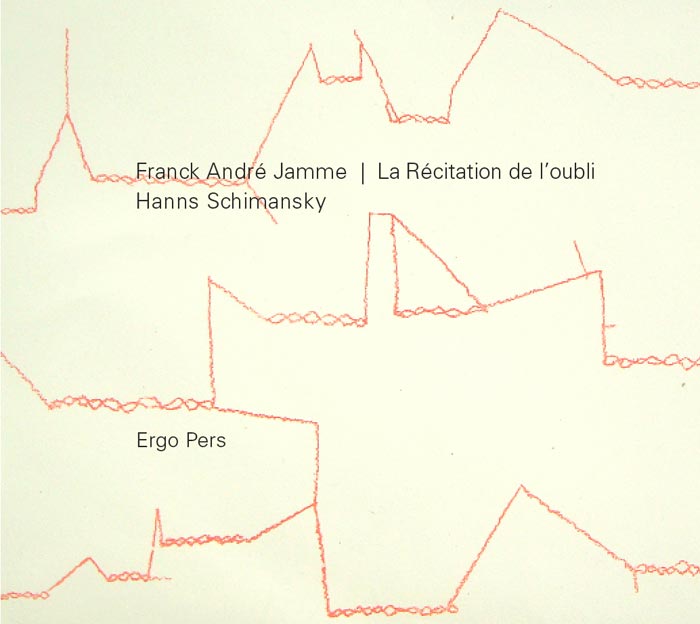 |
Bruce Naumans Burning Small Fires (1968)
|
|
Jürgen Partenheimer, Cees Nooteboom,
De slapendegoden | Sueños y otras mentiras, Ergo Pers, Ghent, 2005 |
|
John Ashbery, The Recital, Ergo Pers 2009, with etchings by HannsSchimansky)
|

[1] Ergo Pers is a publisher of artists books, first editions of Dutch poetry and editions of French or English poetry in translation. Since its founding in 1995 Rein Ergo has brought together writers and artists to explore verbal and visual relations, such as Jürgen Partenheimer, Hanns Schimansky, John Ashbery, Philippe Vandenberg, Ronald Noorman André du Bouchet, Jerome Rothenberg and many others.
Website: www.artistsbooks.be
[2] Ths information was taken from the Wikipedia page Edward Ruscha. The text of this alinea is available under the Creative Commons Attribution-ShareAlike License 4.0;
Later book projects include:
Country Cityscapes, 2001
ME and THE, 2002
Ed Ruscha and Photography, 2004 (with Sylvia Wolf)
OH / NO, 2008
Dirty Baby, 2010 (with Nels Cline and David Breskin)
[3] Photo by By Christian Zürn, CC BY 3.0, Link.
Vienna Secession, Vereinigung bildender Künstler*innen Wiener Secession, Friedrichstraße 12, 1010 Vienna | Ed Ruscha in conversation with Kasper König
[4] Edward Ruscha. (2023, September 16). In Wikipedia. https://en.wikipedia.org/wiki/Edward_Ruscha
[5] Dana Goodyear (11 April 2011), Ed Ruscha: 'California Postcard: Moving Day' The New Yorker.
[6] Ed Ruscha: Books & Co., March 5 - April 27, 2013 Gagosian Gallery, New York. A poverty of ideas speaks here. Rather than an homage, this is an over-simplification of Ed Ruscha's work
[7] This picture of a Broken Glass precedes Ed Ruscha's sensational Broken Glass painting of 1967-68 in which the sharp attention to colour and the glorification of everyday objects that have come to define the artist's unique and instantly recognisable style is striking. It is a distinctly bright example of Ruscha's series of wordless paintings made in the 1960s.
This work was first shown in the pioneering Pop Art exhibition at London's Hayward Gallery in 1969, along with works by Andy Warhol, Roy Lichtenstein and Jasper Johns.
There is also an obvious reference to Marcel Duchamp's Broken Glass, The Bride Stripped Bare by Her Bachelors.
[8] Ed Ruscha, Sayings from Mark Twain's Pudd'nhead Wilson, Limestone Press, (1995).
Sayings from Pudd'nhead Wilson was published by Greve/Hine and Limestone Press. It contains ten original colour lithographs, each with a colourful vernacular phrase such as "Is You Feared O' De Haunted House?" and "Jes Listen to Dat" selected by the artist from Mark Twain's 1894 novel "Pudd'nhead Wilson", and handwritten in Ruscha's own letters on a wood-grain background. The cover features a unique stencil-bleached letter "S" designed by the artist. The edition of this special book was limited to fifty copies plus ten a.p. copies.
|

|
|
 |
|
 |
Ed Ruscha / Now Then: A Retrospective, The Museum of Modern Art, New York, 2023 |
|
Clive Phillpot, Cornelia Lauf, Artist/Author. Contemporary Artists' Books, Distributed Art Publishers, New York, 1998
|
|
Alexandra Schwartz, Leave Any Information at the Signal: Writings, Interviews, Bits, Pages by Ed Ruscha, The MIT Press, Cambridge, Massachusetts, London, England, 2002
|
|
|
